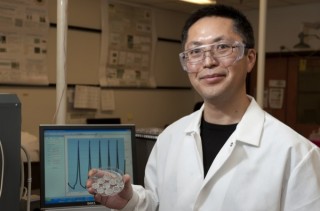Sticky Composites Improve, 'Green Up' Lithium-Ion Batteries

University of Delaware Bingqing Wei leads a research team at the University of Delaware that has discovered that fragmented carbon nanotube films can serve as adhesive conductors in lithium-ion batteries.
Now, a team of researchers at the University of Delaware has discovered a “sticky” conductive material that may eliminate the need for binders.
“The problem with the current technology is that the binders impair the electrochemical performance of the battery because of their insulating properties,” says Bingqing Wei, professor of mechanical engineering.
“Furthermore, the organic solvents used to mix the binders and conductive materials together not only add to the expense of the final product, but also are toxic to humans.”
Carbon nanotubes to the rescue.
Wei and doctoral student Zeyuan Cao recently discovered that fragmented carbon nanotube macrofilms (FCNT) can serve as adhesive conductors, combining two functions in one material. Their work is reported in ACS Nano, a specialty publication of the American Chemical Society, and they have filed a patent application on the discovery.
Wei explains that FCNTs are web-like meshes with “tentacles” that are coupled with active lithium-based cathode and anode materials. They are then assembled using simple ultrasound processing. The process employs no organic solvents.
“We’ve found that the adhesive FCNT conductors actually have higher adhesion strength than PVDF, the binder traditionally used in lithium-ion battery manufacturing,” he says. “We’ve also demonstrated that these composite electrodes exhibit higher electrical conductivity than traditional materials, and we’ve achieved these benefits in a low-cost green fabrication process that replaces toxic organic solvents with just water and alcohol.”
“There is a wide market for lithium-ion batteries,” he adds, “and we see great potential for the use of this technology in vehicle applications, where quick charging and discharging are required.”
The approach strategy could also be employed for electrode preparation for other energy storage devices such as electrochemical capacitors.
Media Contact
More Information:
http://www.udel.eduAll latest news from the category: Materials Sciences
Materials management deals with the research, development, manufacturing and processing of raw and industrial materials. Key aspects here are biological and medical issues, which play an increasingly important role in this field.
innovations-report offers in-depth articles related to the development and application of materials and the structure and properties of new materials.
Newest articles

Why getting in touch with our ‘gerbil brain’ could help machines listen better
Macquarie University researchers have debunked a 75-year-old theory about how humans determine where sounds are coming from, and it could unlock the secret to creating a next generation of more…

Attosecond core-level spectroscopy reveals real-time molecular dynamics
Chemical reactions are complex mechanisms. Many different dynamical processes are involved, affecting both the electrons and the nucleus of the present atoms. Very often the strongly coupled electron and nuclear…

Free-forming organelles help plants adapt to climate change
Scientists uncover how plants “see” shades of light, temperature. Plants’ ability to sense light and temperature, and their ability to adapt to climate change, hinges on free-forming structures in their…





















